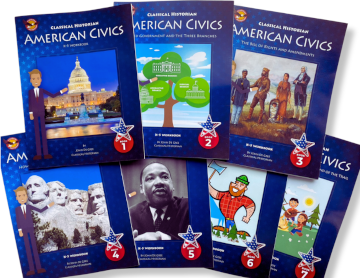Classical Historian American Civics is a series of seven workbooks that approach civics education with the idea that good citizens need both knowledge and virtue.
The publisher’s website explains the impetus for this series:
Young Americans do not value the United States of America because they do not know or understand what it is. They have no idea of the liberties Americans enjoy, the sacrifices those before us made to found and build our country, and they do not see how easy it could be for us to lose our way of life. It is not the fault of these young people that they do not value living in the modern world's first republic. It is the fault of our education system run by older Americans who are failing to teach the basics of civics.
To remedy the problem, this series teaches patriotism and appreciation for our country.
The series is written for kindergarten through fifth grade. Lessons require no preparation and are easy to present. Some fourth and fifth graders could work through them on their own, but they will probably benefit from the discussions likely to occur if a parent reads the lessons aloud.
Book 1 lays the foundation by discussing key historical influences behind our constitutional republic in easy-to-understand language. The other six books have subtitles that describe their content.
- Book 2 - Limited Government and the Three Branches
- Book 3 - The Bill of Rights and Amendments
- Book 4 - How Law is Made and American Heroes
- Book 5 - American Reforms: Slavery and the Civil Rights Movement
- Book 6 - Important Documents, Dates, and Folktales
- Book 7 – American Songs: Patriotic, Folk, Fun & End of the Trail
Throughout most of the books, each lesson is presented on one page with a facing coloring page. For instance, in the lesson in Book 1 about the influences of the Roman Republic on the U.S., the coloring page has an image of the public posting of Roman laws, known as the Twelve Tables.
Each lesson is presented in a few paragraphs of text, written at a level understandable by most children in third grade and above. The text is followed by a set of questions with blank lines for answers. Younger students might dictate answers for parents to write for them. The amount of text per lesson gradually increases through Book 7.
In a few instances in Book 5 and Book 6, a biography or a folktale takes up the entire page, and there are no questions. Also, in Book 6, an entire unit is used to create a timeline for 10 key events in U.S. history. (Students color, cut, and paste images into "cards" on the timeline. They can cut out the cards, use them for review, and store them in a pouch constructed from a page in the back of the book.) Book 7 teaches the Pledge of Allegiance, patriotic songs, and folk songs with no questions at all. Recordings of the songs and the Pledge of Allegiance are available through Spotify, YouTube music channel, Apple Music, iTunes, Deezer, and the Classical Historian's YouTube channel.
The seven books are each divided into two or three units with a five-question, multiple-choice quiz at the end of most units. Answer keys are at the back of each book, except Book 7 since it has no quizzes. All except Book 7 also have a page at the back that lists Key Words and Terms for each lesson.
How to Use the Books
Five pages near the beginning of each book present "Ideas for Instruction" with detailed suggestions for scheduling either homeschool or group classes. This section explains why Book 7 is formatted so differently. The idea is that the songs and the Pledge of Allegiance should be taught to all students and repeated frequently as you work through the rest of the series. Similarly, the timeline cards in Book 6 might be used along with other books.
Children up through third grade are most likely to use the coloring pages, and those in fourth grade and above should begin to write and make oral presentations about what they have learned. The keywords and terms in most of the books might look familiar to those familiar with IEW’s Structure and Style writing lessons, since writing down keywords from a passage and reconstructing the passage from only those keywords is a primary element of Structure and Style's methodology. The keywords and terms have been selected with that process in mind. That process is explained in the "Ideas for Instruction" so that students unfamiliar with Structure and Style can still use the method to write about what they have learned and give oral presentations. This is an excellent reinforcement strategy, so I encourage parents to use it, especially with fourth and fifth graders.
Summary
Classical Historian American Civics is an excellent series that provides homeschoolers with an easy-to-use, gentle introduction to civics that should inspire patriotism while teaching basic information about our government.
Note: this review is for the revised second editions published in 2024.

















